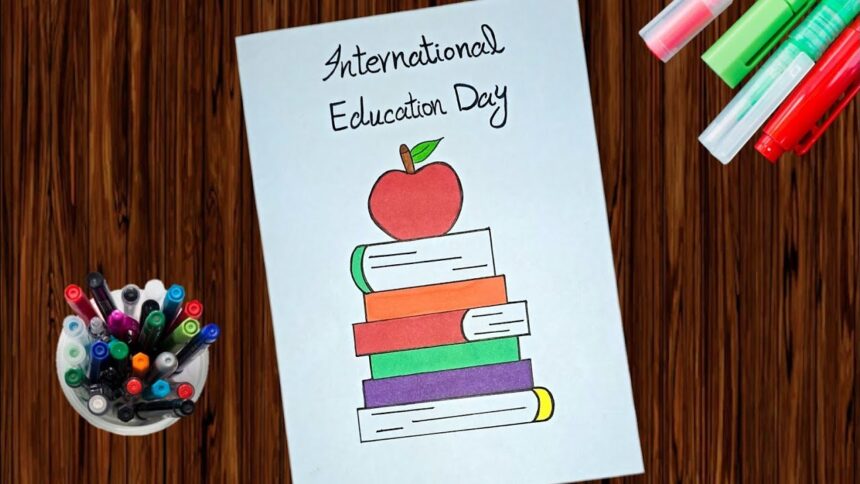International Education Day: A Global Celebration of Learning, Growth, and Opportunity
Every year, on January 24, the world celebrates International Education Day, a day dedicated to promoting education as a fundamental human right and a powerful tool for global development. Education plays a central role in shaping our future, empowering individuals, and lifting communities out of poverty. On this day, countries around the world unite to raise awareness about the importance of education in achieving sustainable development goals, social equality, and peace.
In this article, we will explore the history of International Education Day, its significance, the impact education has on daily life, and why this observance is so important to society.
History and Origins of International Education Day
International Education Day was declared by the United Nations (UN) in 2018, in alignment with its broader goal of promoting education as a means to achieve peace and sustainable development. The day emphasizes the role of education in driving global progress, focusing on the transformative power of knowledge and learning in tackling key global challenges such as poverty, inequality, and climate change.
The UN adopted the Sustainable Development Goal (SDG) 4, which aims to ensure inclusive, equitable, and quality education for all by 2030. International Education Day is a reminder of this commitment and a call to action for governments, organizations, and individuals to take steps to improve educational access and quality worldwide.
5 Incredible Facts About International Education Day
- Global Focus on Education: International Education Day serves as a platform to highlight the importance of education in addressing global challenges, from poverty alleviation to achieving gender equality.
- Annual UN Events: The United Nations organizes annual events on this day to raise awareness about educational issues around the world. This includes global discussions, conferences, and campaigns focused on improving access to education.
- SDG 4 – Education for All: International Education Day promotes SDG 4, which aims to ensure that every child, adolescent, and adult has access to quality education, regardless of their socioeconomic background.
- Educational Disparities: The observance of this day also brings attention to the educational inequalities faced by marginalized groups, including girls, refugees, and children with disabilities.
- Technology in Education: The day also highlights the role of technology in transforming education, particularly in remote or underserved areas, and improving access to learning materials and resources.
The Daily Life Impacts of International Education Day
While the celebrations of International Education Day are important, the real-world impact of education can be seen in the daily lives of individuals across the globe. Education is a tool that empowers individuals to improve their quality of life and contribute to their communities.
- Improved Socioeconomic Status: Education is a key driver of upward mobility. It opens doors to better job opportunities, higher income, and improved social status. Educated individuals are more likely to secure stable employment and contribute to their country’s economy.
- Health and Well-being: Education, particularly for women and girls, leads to improved health outcomes. Educated people are more likely to make informed choices regarding nutrition, healthcare, and family planning, which contributes to healthier families and communities.
- Gender Equality: International Education Day brings attention to the fact that education is a powerful tool for achieving gender equality. Educated women and girls are more likely to challenge traditional gender roles and access better career opportunities, breaking the cycle of inequality.
- Promoting Peace: Education fosters understanding, tolerance, and empathy. It helps individuals from different backgrounds come together, promoting social harmony and peace within communities.
- Empowering Marginalized Communities: Education empowers marginalized communities by providing them with the knowledge and skills needed to challenge systemic inequalities and advocate for their rights.
Frequently Asked Questions (FAQs) About International Education Day
Q: What is the purpose of International Education Day?
A: The purpose of International Education Day is to raise awareness about the importance of education as a human right and a vital tool for sustainable development. It highlights the need to provide quality education to everyone, everywhere.
Q: How can people participate in International Education Day?
A: People can participate in International Education Day by joining events, discussions, or online campaigns focused on promoting education. Schools and organizations can host awareness programs to highlight educational challenges and solutions.
Q: Why is education important for the world?
A: Education is important because it empowers individuals, improves livelihoods, fosters social equality, and drives sustainable economic growth. It also plays a crucial role in achieving global peace and addressing issues like poverty, inequality, and climate change.
Q: How does education contribute to gender equality?
A: Education empowers women and girls, giving them the tools and knowledge to fight for their rights, access better opportunities, and challenge traditional gender norms. It enables them to participate fully in society and contribute to the economy.
The Significance of International Education Day in Society
International Education Day is an opportunity to reflect on the critical role that education plays in shaping our world. From its ability to improve individual lives to its potential to transform societies, education is key to achieving a more just, equitable, and sustainable world.
- A Tool for Empowerment: Education is one of the most powerful tools for personal and societal empowerment. It equips individuals with the knowledge and skills needed to improve their lives and contribute positively to their communities.
- Fostering Global Citizenship: Education promotes global citizenship by encouraging individuals to understand and appreciate cultural diversity, while also recognizing shared human rights and responsibilities.
- Breaking the Cycle of Poverty: By providing people with the skills and knowledge they need to secure better jobs, education breaks the cycle of poverty and creates opportunities for future generations.
- A Pathway to Peace: Education fosters mutual respect, tolerance, and understanding between people from different cultures and backgrounds, helping to create more peaceful and harmonious societies.
- Addressing Inequality: International Education Day highlights the need to eliminate educational disparities and ensure that everyone, regardless of their gender, race, or socioeconomic status, has access to quality education.
Wishing a Bright Future for Education
On this International Education Day, we celebrate the power of education and its ability to transform lives and societies. Let’s continue working towards a future where every child, adolescent, and adult has access to quality education. By empowering individuals with knowledge, we can build a better, more equitable world for all.
Conclusion: The Lasting Impact of Education on Society
International Education Day is not just about celebrating education; it is about recognizing the urgent need for greater access to education worldwide. Education has the power to create opportunities, break barriers, and change lives. On this day, we renew our commitment to making education a universal right, working towards a future where everyone has the opportunity to learn, grow, and thrive.










